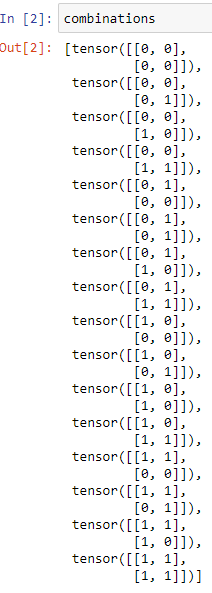Hi Majid!
Here is a loop-free approach that uses pytorch tensor operations:
>>> import torch
>>> torch.__version__
'1.12.0'
>>> K = 2
>>> N = 2
>>> (torch.bitwise_and (torch.arange (2**(K*N), device = 'cuda').unsqueeze (-1), 2**torch.arange (K*N, device = 'cuda')) > 0).long().reshape (2**(K*N), K, N)
tensor([[[0, 0],
[0, 0]],
[[1, 0],
[0, 0]],
[[0, 1],
[0, 0]],
[[1, 1],
[0, 0]],
[[0, 0],
[1, 0]],
[[1, 0],
[1, 0]],
[[0, 1],
[1, 0]],
[[1, 1],
[1, 0]],
[[0, 0],
[0, 1]],
[[1, 0],
[0, 1]],
[[0, 1],
[0, 1]],
[[1, 1],
[0, 1]],
[[0, 0],
[1, 1]],
[[1, 0],
[1, 1]],
[[0, 1],
[1, 1]],
[[1, 1],
[1, 1]]], device='cuda:0')
Note that for even small values of K and N there will be a lot of such
tensors. For your example of K = N = 5 your final result will consist
of about 800 million elements.
I don’t know of a pytorch function that will give you “all possible combinations”
of some arbitrary sets of values. For your “0-1” example, we may obtain the
desired result from the binary representations of the integers up to 2**(K*N).
Best.
K. Frank
